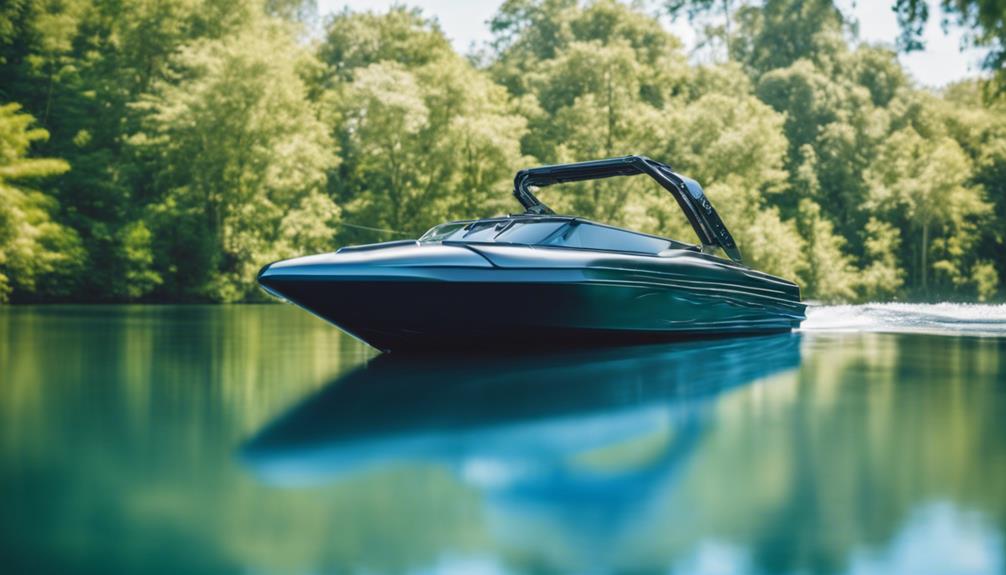Yes, you need to winterize your jet boat to prevent costly damage. Start by draining all water from the engine and systems to avoid corrosion. Run the engine out of water to eliminate any remaining moisture. Don't forget to add antifreeze for freeze protection. Regularly change the oil and stabilize the fuel to maintain engine performance. It's vital to inspect drainage and guarantee effective antifreeze application. Neglecting these steps could lead to engine failure. If you want more detailed tips on how to winterize effectively, there's plenty of essential information to guide you.
Key Takeaways
- Winterizing your jet boat prevents engine corrosion and freeze damage during cold months, ensuring optimal performance in warmer weather.
- Regular oil changes and fuel stabilization are crucial for maintaining engine integrity during storage.
- Thoroughly drain all water from the engine and water systems to avoid freezing issues.
- Use appropriate antifreeze to protect the engine from freeze damage in cold climates.
Essential Winterization Steps
To protect your jet boat from freezing damage, you need to follow essential winterization steps that guarantee all water is drained and the engine is properly maintained.
Start by thoroughly draining all the water from the engine and water systems. Any residual moisture can compromise the effectiveness of the antifreeze and lead to corrosion, so this step is vital.
After draining, run the engine out of the water to help eliminate any remaining water. Once that's done, introduce antifreeze into the system to safeguard against freezing. Make certain to use the appropriate antifreeze for your jet boat, as this will provide the necessary protection during the colder months.
Additionally, consult your owner's manual for specific winterization guidelines tailored to your model. These instructions will help make sure you don't miss any critical steps in the process.
Taking the time to correctly winterize your jet boat not only protects the engine from potential damage but also guarantees it's ready for smooth operation when the season resumes. By following these essential steps, you'll extend the life of your boat and enjoy peace of mind throughout the winter.
Oil and Fuel Maintenance
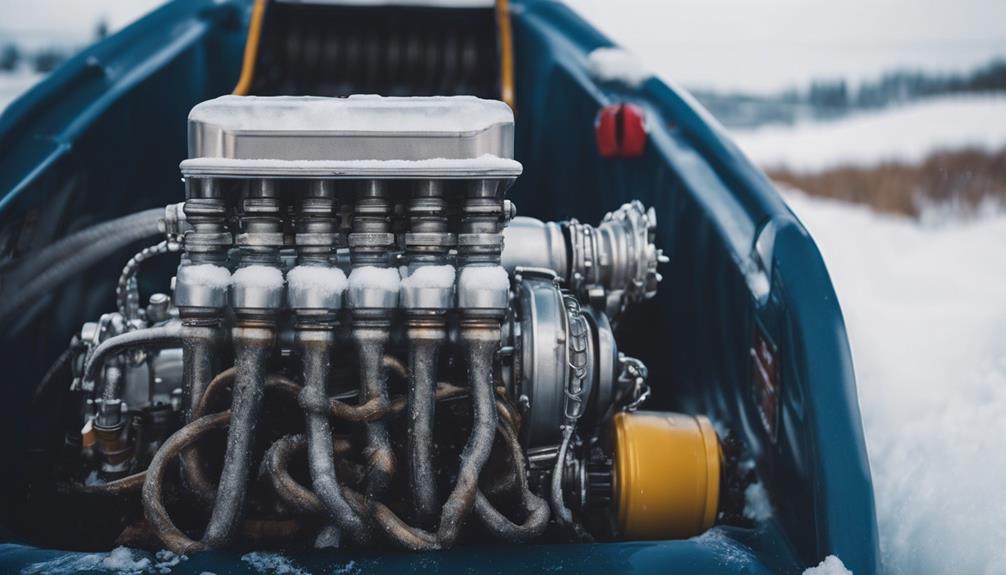
When winterizing your jet boat, don't overlook the importance of oil and fuel maintenance.
You need to change the oil regularly and stabilize the fuel to protect your engine from damage during the off-season.
Also, make sure to inspect the fuel filter to keep everything running smoothly when you're ready to hit the water again.
Change Oil Regularly
Regular oil changes are crucial for your jet boat's engine health, preventing damage from acids and moisture during the winter months. When you change oil regularly, you help maintain the integrity of your engine oil, ensuring it can effectively lubricate and protect the internal components. Residual acids and moisture can lead to rust and corrosion, which can quickly deteriorate engine performance.
Before you change the oil, it's a good idea to run the engine briefly. This reduces the oil's viscosity, allowing for better drainage and more effective removal of impurities. Once you've drained the old oil, don't forget to replace the oil filter. After installation, always check for leaks to maintain peak engine performance and prevent oil loss.
Performing an oil change before winter storage is a crucial step in prolonging your engine's life. Fresh oil circulation not only protects against wear but also combats rust and corrosion. By taking the time to change the oil regularly, you'll be investing in your jet boat's longevity and avoiding costly repairs down the line.
Don't skip this essential maintenance task!
Stabilize Fuel Effectively
Stabilizing the fuel in your jet boat is essential to prevent oxidation and phase separation, which can harm the engine during off-season storage. Start by treating the fuel in your fuel tank with a high-quality fuel stabilizer. This will help preserve the fuel's integrity and keep your engine running smoothly when you're ready to hit the water again.
Make certain to fill the fuel tank to at least 95% capacity before storage. This minimizes moisture absorption and reduces condensation risk inside the tank. After adding the stabilizer, run your engine for about 30 seconds to guarantee the treated fuel circulates throughout the entire fuel system.
Here's a quick reference table to help you with fuel stabilization:
| Step | Description |
|---|---|
| Add Fuel Stabilizer | Treat the fuel in your tank with stabilizer. |
| Fill Fuel Tank | Fill to at least 95% to reduce condensation. |
| Run Engine | Run for 30 seconds to circulate treated fuel. |
| Proper Disposal (if draining) | Follow guidelines for old fuel disposal. |
Inspect Fuel Filter
After confirming your fuel is stabilized, it's time to inspect and replace the fuel filter to maintain efficient fuel flow and protect your engine from contaminants. A clogged fuel filter can hinder your jet boat's performance and even cause engine failure.
To keep your boat in top shape, follow these essential tips:
- Check the fuel filter regularly: Aim to inspect it at least once a year or every 100 hours of operation.
- Use quality fuel filters: Choose a filter that meets your jet boat's specifications for maximum efficiency.
- Replace when needed: If you notice decreased engine performance or increased fuel consumption, it's time for a change.
- Run the engine briefly: After replacing the filter, run the engine to confirm everything's functioning smoothly.
Water Management Techniques
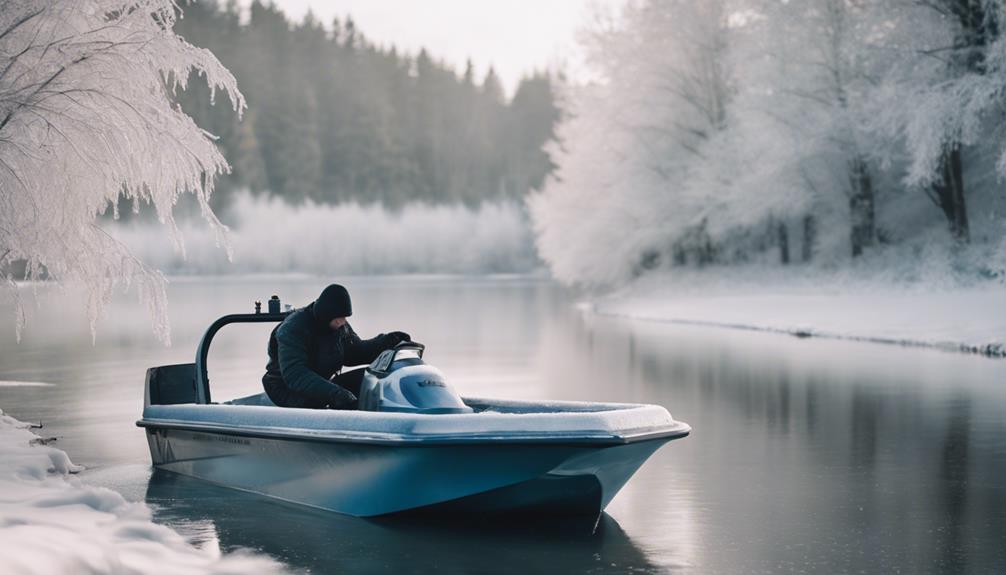
When winterizing your jet boat, managing water effectively is essential to prevent freeze damage.
You'll want to understand drainage methods, apply antifreeze correctly, and troubleshoot any water flow issues that may arise.
Let's explore these key techniques to guarantee your boat stays in top shape during the cold months.
Drainage Methods Explained
Properly draining your jet boat is critical to prevent freezing and damage during winter storage. Since jet boats use a jet propulsion system, they lack traditional water pumps, making effective drainage essential.
Here are some key steps to follow for proper drainage:
- Locate and remove drain plugs: Find the plugs between the cylinders and above the oil pan. Removing them allows residual water to exit.
- Clear debris: Check drainage holes for any debris that could obstruct water flow. A clear path is important for effective drainage.
- Run the engine out of water: This helps expel any remaining water from the system, making winterization easier.
- Use antifreeze if needed: If you choose to use antifreeze, make sure that the tank is elevated above the engine for gravity feeding, promoting complete antifreeze circulation.
Antifreeze Application Guidelines
Applying antifreeze to your jet boat's system is critical for protecting its engine and cooling components from freezing temperatures during winter storage. Start by verifying all water is drained from the engine and water systems, as any remaining water can lead to freeze damage. Once the system is clear, introduce antifreeze to provide that essential protection.
To effectively apply antifreeze, elevate the antifreeze tank above the engine. This setup helps create ideal flow, allowing the antifreeze to circulate throughout the entire system, including the engine block where it's most needed. If gravity feed isn't enough to fill the system, consider using a pressurized antifreeze application to guarantee all areas, including the jet intake, are adequately covered.
Additionally, make it a habit to regularly check for any drainage blockages. Proper antifreeze circulation is crucial, as trapped water could compromise the effectiveness of your winterization efforts. By following these antifreeze application guidelines, you can safeguard your jet boat from potential freeze damage and guarantee it's ready for a smooth start when the warmer months return.
Troubleshooting Water Flow Issues
After verifying antifreeze has been applied correctly, you might encounter water flow issues that can impede the effectiveness of your winterization efforts. Proper water flow is crucial for preventing freeze damage and confirming your jet boat is ready for the off-season.
Here are some troubleshooting steps to reflect upon:
- Inspect drainage holes: Clear any debris that may block water flow.
- Check for trapped air: Use a compressor to apply air to the vent hole in the antifreeze tank if water flow stops.
- Drain the block: Pull the drain plugs located between cylinders above the oil pan to eliminate residual water.
- Examine the pump housing: Regular maintenance checks can help identify wear and optimize drainage capabilities.
Specific Engine Types
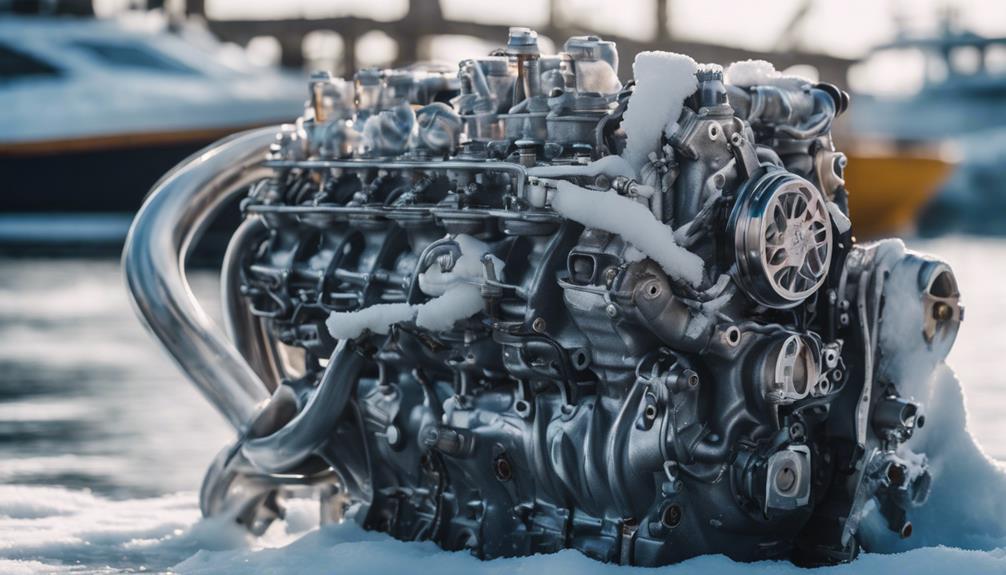
Understanding the specific engine types in jet boats is vital for effective winterization and guaranteeing peak performance when the boating season resumes. Different engines may require unique approaches, but a few fundamental steps apply universally.
First, you need to drain all water from the engine block and components. This helps prevent any residual water from raising the freeze point of antifreeze. While jet boats typically self-drain, always check and clear any debris from drainage holes to guarantee proper flow.
Once you've confirmed the engine is free of water, it's time to run antifreeze through the system. You'll want to pressure feed antifreeze into the engine to protect it from freezing damage.
Don't forget to use fogging oil! While the engine runs, introduce fogging oil into the carburetor. This step is vital for protecting internal components from rust during storage.
Environmental Considerations
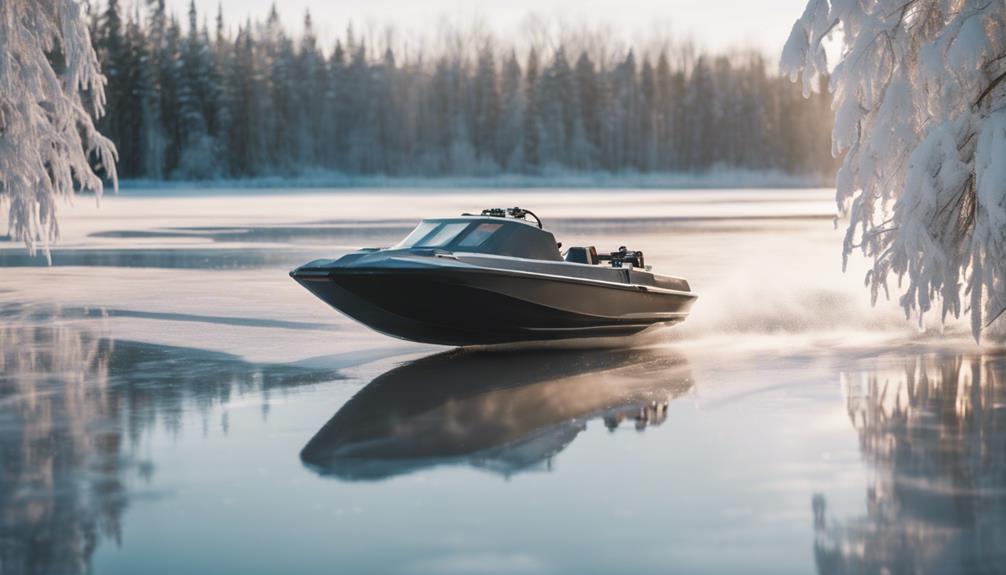
Taking environmental considerations into account during the winterization of your jet boat is essential for protecting aquatic ecosystems and minimizing your ecological footprint. Here are some practical tips to guarantee you're doing your part:
- Use propylene glycol antifreeze instead of traditional options, as it's less toxic and better for the environment.
- Capture and dispose of antifreeze properly to prevent accidental discharge into water sources, safeguarding local wildlife.
- Utilize oil-absorbent pads during maintenance to catch spills, reducing the risk of harmful substances entering the water.
- Employ small containers for handling hazardous materials like oil and antifreeze, minimizing the potential for spills.
Annual Maintenance Importance
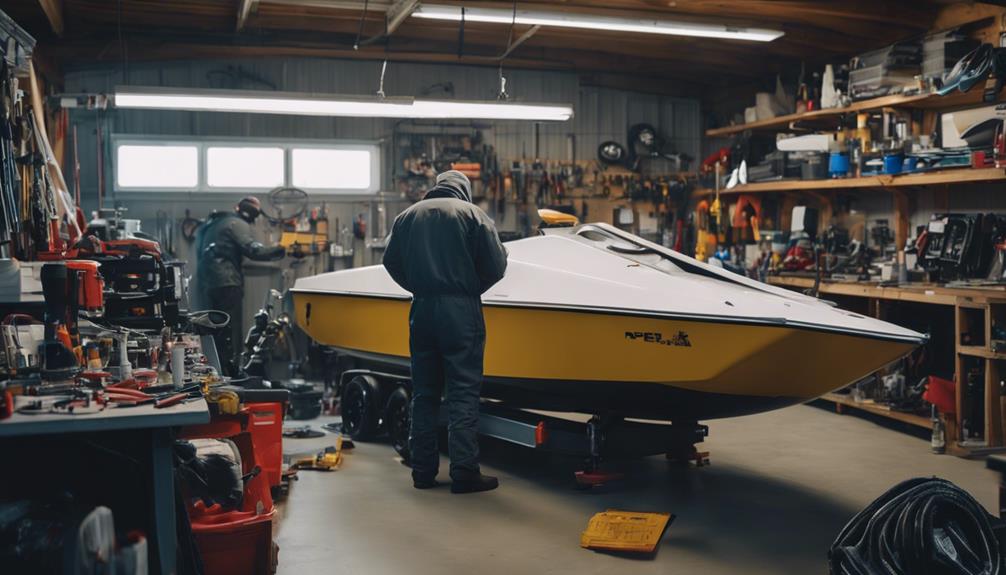
Annual maintenance is important for keeping your jet boat running smoothly and extending its lifespan. Regularly changing the oil and oil filter guarantees your engine performs effectively, while inspections of the pump and its components help you catch wear and tear before it leads to costly repairs. This proactive approach assures reliability during the boating season.
Fuel care can't be overlooked either. Stabilizing your fuel and changing the fuel filters are essential tasks that prevent engine issues when you take your boat out of winter storage. Additionally, draining water from the system during annual maintenance is critical in avoiding freezing damage during harsh weather.
If you live in an area prone to freezing weather, it's especially important to winterize your engine with antifreeze. This step protects your engine and other crucial systems from freezing and potentially cracking.
Heated Storage Risks

While heated storage may seem like a safe option for your jet boat, it can lead to dangerous misconceptions about the necessity of proper winterization. Many boat owners mistakenly believe that as long as their boat is kept in a heated environment, they don't need to worry about winterizing. However, this can be a risky assumption.
Consider these potential risks:
- Power outages during winter storms can leave your heated storage without heat.
- Residual water left in the engine and systems can freeze even in heated areas.
- Neglecting winterization can lead to costly repairs if freezing damage occurs.
- Unexpected cold snaps can catch boat owners off guard, leading to serious issues.
It's essential to remember that it's always 'time to winterize.' Don't let the warmth of your storage trick you into overlooking important steps.
Regular maintenance and proper winterization are critical to protect your investment and guarantee your jet boat is ready for the next season.
Don't take chances—confirm your boat is secure.
Frequently Asked Questions
Is It Necessary to Winterize a Jet Boat?
Yes, it's necessary to winterize your jet boat. Proper winterization prevents freeze damage, guarantees all water drains, and protects your engine. Don't forget to stabilize fuel and check for any maintenance needs before storage.
Are You Supposed to Winterize Jet Skis?
Yes, you're supposed to winterize jet skis. Draining water, adding fuel stabilizer, and using fogging oil protects your engine from freezing damage. Regularly check spark plugs and filters to guarantee a smooth start-up next season.
What Needs to Be Winterized on a Boat?
As winter wraps its frosty fingers around your boat, you'll need to winterize the engine, drain water systems, replace oil and filters, treat fuel, and inspect components to guarantee smooth sailing when spring arrives.
How to Winterize an Outboard Jet Motor?
To winterize your outboard jet motor, fill the tank with fuel stabilizer, run the engine briefly, fog it with oil, drain the carburetor, and guarantee all water is thoroughly removed to prevent freezing damage.
What Precautions Should I Take to Ensure My Jet Boat Doesn’t Get Clogged During Winterization?
When preparing your jet boat for winter, it’s crucial to take precautions to prevent jet boat clogging issues. Use a fuel stabilizer to maintain the fuel system, flush the engine with antifreeze to prevent water buildup, and ensure all drainage holes are clear. Store it in a dry, covered area.
Conclusion
To summarize, winterizing your jet boat isn't just a good idea; it's essential.
Did you know that neglecting this process can lead to costly repairs, with some estimates reaching over $3,000?
By taking the time to follow these winterization steps, you can protect your investment and guarantee smooth sailing come spring.
Don't wait until it's too late—start prepping your boat now and enjoy peace of mind all winter long!





